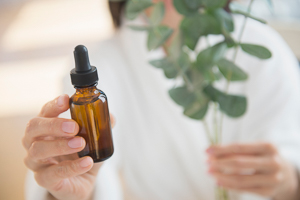Tea Tree Oil (Melaleuca Alternifolia)
Topic Overview

What is tea tree oil?
Tea tree oil can kill bacteria and fungi. It comes from the evergreen leaves of the Australian Melaleuca alternifolia tree. Tea tree oil has been used as complementary therapy in surgery, burn care, and dental care.
Numerous tea tree oil body care products are available, including soap, shampoo, toothpaste, lip balm, topical (used on the skin) cream, and essential oil.
What is tea tree oil used for?
People usually use tea tree oil to treat minor cuts, burns, acne, athlete’s foot, mild fungal nail infections, vaginal yeast infections, and lung problems (when they add the oil to a bath or vaporizer). Although there is little research on tea tree oil, some studies suggest that it is safe and often effective for the prevention and treatment of infections.footnote 1
Is tea tree oil safe?
Experts consider tea tree oil to be safe as a topical treatment, and you can apply it directly to the skin on a daily basis. When applied to the skin in its pure (100% oil) form, tea tree oil seldom causes irritation. But some people develop an allergic rash (contact dermatitis). If you are concerned that you might develop a rash, try the oil first on a small area of skin. You can also dilute tea tree oil with vegetable, olive, or almond oil.
Tea tree oil is not safe to take by mouth. It is not recommended for use in the ears, because it may cause damage to the inner ear.
The U.S. Food and Drug Administration (FDA) does not regulate tea tree oil in the same way it regulates medicines. It can be sold with limited or no research on how well it works.
Always tell your doctor if you are using an alternative product or if you are thinking about combining one with your conventional medical treatment. It may not be safe to forgo your conventional medical treatment and rely only on an alternative product.
References
Citations
- Murray MT (2013). Melaleuca alternifolia (tea tree). In JE Pizzorno, MT Murray, eds., Textbook of Natural Medicine, 4th ed., pp. 852–856. St. Louis: Mosby.
Other Works Consulted
- Tea tree oil (2010). In A DerMarderosian et al., eds., Review of Natural Products. St. Louis: Wolters Kluwer Health.
Current as of: April 9, 2019
Author: Healthwise Staff
Medical Review:Adam Husney, MD – Family Medicine
Topic Contents
This information does not replace the advice of a doctor. Healthwise, Incorporated, disclaims any warranty or liability for your use of this information. Your use of this information means that you agree to the Terms of Use. Learn how we develop our content.

